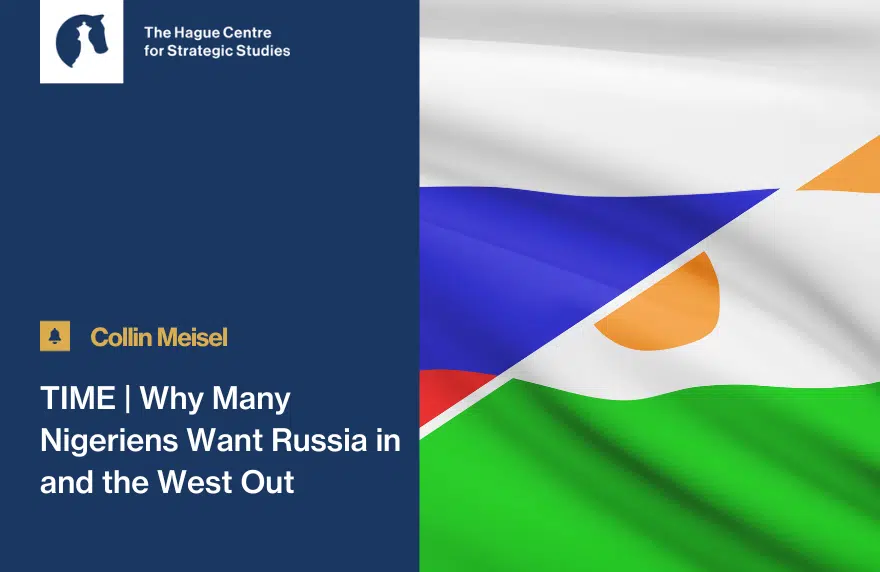Words matter. And the word “enemy” is particularly unhelpful in the context of U.S.-China relations, writes HCSS subject matter expert Collin Meisel in an op-ed for The Hill. A more productive approach to take “the China challenge” seriously is through face-to-face dialogue. Such dialogue between international leaders holds a significant weight in diplomacy. Critics might call this approach appeasement. But the reality is that, even if U.S.-China relations were to devolve into open hostilities and officially transform the two states into enemies, communication with an enemy during a conflict is critical for avoiding an escalation spiral.
Opinion | “I think China’s an enemy. I think we have to take them incredibly seriously,” Nikki Haley recently said. Haley, the former U.N. ambassador and current GOP presidential candidate, had other incendiary remarks to share on CNBC’s “Squawk Box,” accusing China of “killing Americans,” a reference to Beijing’s failure to curb shipment of fentanyl precursor chemicals to Mexico, which are then smuggled into the U.S.
With regards to fentanyl, Haley has a point, even if her rhetoric is unnecessarily inflammatory. In 2022, opioid overdoses, largely involving fentanyl, killed approximately 70,000 Americans — roughly the population of Wilmington, Delaware. And there is no doubt that China must be taken seriously. In a recent meeting between Secretary of State Antony Blinken and Chinese President Xi Jinping, the Chinese side explicitly referenced a “spiraling decline” in relations between the world’s two largest economies, which continue to approach global power parity.
That said, words matter. And the word “enemy” is particularly unhelpful in the context of U.S.-China relations.
Sadly, Haley’s rhetoric neatly follows “the traditional American assumption that only a few evil leaders stood in the way of a worldwide acceptance of American values and hence of peace” — a diagnosis made by historian Eric F. Goldman regarding some American leaders’ attitudes during the Cold War, but one that remains apt today. This tradition, embodied by words such as “enemy,” are an act of “othering,” dividing the world in an “us vs. them” mentality.
There are three problems with describing China as an “enemy.” First, it’s factually untrue according to U.S. law, which describes an enemy as “any country, government, group, or person that has been engaged in hostilities, whether or not lawfully authorized, with the United States.” While U.S.-China relations have at times become hostile, any actual hostilities, meaning direct combat between U.S. and Chinese forces, have been avoided for quite some time.
Second, it requires clarification that it is not the Chinese people who are the enemy but the Chinese Communist Party, which has “taken over China,” in Haley’s words. Surely, the Chinese Communist Party does not represent all Chinese, and the party has legally situated itself above the government, but it would be a mistake to act as if China would embrace Western-style liberal democracy if not for the CCP. There is a broad range of perspectives among Chinese intellectuals and the public, some of which are even more hard-line than official party policy.
Third, and most importantly, a declaration that “China’s an enemy” casts U.S.-China relations in an explicitly antagonistic light. As political scientist David Finlay has argued, “When decision-makers become overly concerned with enemies, actual or imagined, they tend to lose sight of goals and fail to establish equitable or appropriate priorities in balancing interests.”
A case in point is Russian President Vladimir Putin’s explicit “enemization” of the Zelensky government in Ukraine and mistaken assumption that the Ukrainian people were Russians who had been separated from their homeland. Of course, this is not to say that Haley’s remarks are the precursor to a U.S. invasion of China. But they do risk becoming a self-fulfilling prophecy, where both sides begin to internalize what social psychologist Ralph K. White called the “diabolical enemy image.” History is replete with examples of geopolitical competitors transforming into actual enemies thanks to ideological othering and “enemization.”
In contrast to Haley’s “enemy” bombast, a more productive approach to take “the China challenge” seriously is through face-to-face dialogue. Such dialogue between international leaders holds a significant weight in diplomacy. It can offer insights into diplomatic priorities; build trust and rapport; facilitate conflict resolution; encourage cultural exchange; and enhance consensus, cooperation and commitment.
Secretary Blinken’s recent high-stakes visit to Beijing to hold bilateral talks with senior Chinese officials to discuss rising tensions between the U.S. and China is an important example. Since the incident with the Chinese spy balloon and Chinese Defense Minister Li Shangfu’s refusal to meet with Secretary of Defense Lloyd Austin earlier this year, U.S.-China ties have continued to deteriorate. Blinken’s trip to Beijing communicates the Biden administration’s intentions to repair and reignite diplomacy and bilateral relations with China.
Critics might call this approach appeasement. But the reality is that, even if U.S.-China relations were to devolve into open hostilities and officially transform the two states into enemies, communication with an enemy during a conflict is critical for avoiding an escalation spiral. To prevent this outcome, Haley and others should cool their metaphorical jets and consider firing up their actual jets for more shuttle diplomacy between Washington and Beijing — a practice that has successfully eased U.S.-China conflict in the past and has reduced tensions between other capitals more recently.
Collin Meisel is the associate director of Geopolitical Analysis at the University of Denver’s Frederick S. Pardee Center for International Futures, a Geopolitics and Modeling Expert at The Hague Centre for Strategic Studies and a Nonresident Fellow at the Stimson Center. Kylie McKee is a research associate and project manager at the University of Denver’s Frederick S. Pardee Center for International Futures.
Source: Collin Meisel and Kylie McGee, The Hill, August 2nd, 2023





